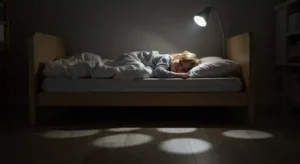Learn why snoring is a warning sign for sleep apnea. Understand the risks, how to identify sleep apnea, and next steps for diagnosis and treatment.
sleep apnea risk: Health alarms rarely go unnoticed. Think of smoke detectors – they’re there to wake us up, not lull us into false security. Warning signs for sleep apnea are much the same. If you or someone in your household snores regularly, it’s time to listen closely.
Snoring: More Than Just Annoyance, It’s a Red Flag
While occasional snoring might be dismissed as insignificant noise, persistent snoring is a potent warning sign for sleep apnea. Sleep apnea isn’t just bad snoring; it’s serious. Characterized by repeated pauses in breathing during sleep (or dangerously low breathing efforts), the disease leads to profound drops in blood oxygen levels and fragmented sleep structure. Partner reports are often the first indicator.
The Health Cost of Ignoring the Warning
The consequence of overlooking this sleep apnea risk is significant. Untreated obstructive sleep apnea increases your chances of developing and worsening numerous health problems, including heart disease, high blood pressure, Type 2 diabetes, and depression. It often saps your energy, leaving individuals feeling exhausted despite seemingly adequate sleep. This constant fatigue isn’t just frustrating – it’s dangerous, heightening risks for drowsy driving accidents and impacting your quality of life. Recognizing these health risks is the first step toward taking control.
What to Do If You’re Snoring
Seeing a connection between snoring and sleep apnea risk, you might be wondering what comes next? Here’s essential guidance: * Speak to a professional: Schedule an appointment with your doctor, sharing the information about your snoring. Mention daytime fatigue, if present, as it’s a common symptom. * Seek an evaluation: If sleep apnea is suspected, your doctor may recommend a consultation with a sleep specialist. This evaluation typically involves either an overnight sleep study (in a lab) or a home sleep apnea test. * Take Charge: Understanding the cause is the first step toward effective treatment. Board-certified sleep experts can then guide you toward the recommended sleep apnea treatment options.
Taking Action for You and Your Bed Partner
Your resident noise-maker could be you or your significant other. But recognizing the potential for sleep apnea is a shared responsibility that benefits both parties. Initiating the conversation and pursuing an accurate diagnosis empowers you both to breathe easier and wake up refreshed.
Conclusion
Snoring’s true significance lies in its potential as a critical warning sign for sleep apnea. By understanding the health risks associated with this often-overlooked symptom and taking proactive steps, you can mitigate its dangers. Don’t wait for circumstances to worsen. Address snoring now and take a decisive step towards improved health and well-being.
Frequently Asked Questions
Is loud snoring always a sign of sleep apnea?
No, loud snoring can be caused by various factors like alcohol, nasal congestion, or being overweight. However, regular, disruptive snoring *is* a common primary symptom used to screen for obstructive sleep apnea.
Besides snoring, what other warning signs point to sleep apnea?
Key warning signs for sleep apnea also include excessive daytime sleepiness or fatigue, observed gasping or choking sounds during sleep by a bed partner, and frequent awakenings with a dry mouth or headache. The sleep apnea risk is also higher for those with high blood pressure, especially if they are overweight.
Sources
- Snoring as a Warning Sign for Sleep Apnea: https://www.healthline.com/health/sleep-disorders/snoring/sign-sleep-apnea
- Symptoms and Signs of Sleep Apnea: https://www.mayoclinic.org/diseases-conditions/sleep-apnea/symptoms-causes/symptoms
- Health Risks of Untreated Sleep Apnea: https://www.nih.gov/health-information/health-topics/adult-sleep-disorders/sleep-apnea








